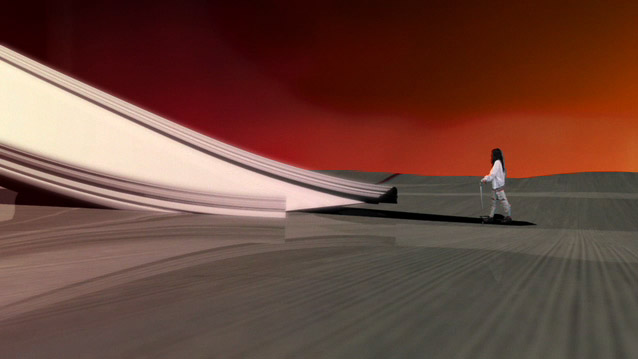YEMENWED
Interview by Michael Bullock
Film still courtesy of Yemwed
Interview Magazine, April 2008
By day Shawn Maximo designs the latest Gucci boutiques including Palm Desert, (Summer 2008), San Francisco (Fall 2008), and Shanghai Golden Eagle (in development). By night he is a member and chief architect for the mysterious New York-based Yemenwed art collaborative, which was founded in 2006 and comprises 19 artists, stylists, animators, and musicians with a common vision. This month the group unveiled its first video piece, Episode 3, a Sci-Fi epic that takes viewers on a spiritual journey through another dimension as envisioned by a remote-viewing protagonist, Sigrid. Beset by various physical restraints, Sigrid has an out-of-body sensory fantasy, which centers on a metronome-shaped building, where architecture, animation, and narrative meld into a surrealistic whole. The architecture in this world looks as if Star Trek were set in Dubai and re-envisioned through a lens of 70s glamour. Shawn discusses the difference between fantasy and reality.
What is Yemenwed? How did you come to be the architect for the group?
Yemenwed is a collaborative project that my life energy partner Gloria Maximo started in 2006. The name comes from a character in one of her comics, who is this sort of amorphous monster or energy form roaming around a parallel reality. For Episode 3, Gloria wanted to visualize the space in her drawings in animation, which called for a lot of spatial realization. In the collaborative each artist works in their area of expertise, while responding to ideas from other disciplines, much like the Black Mountain College collaborations of the 50s. My training as an architect enabled me to take a lot of ideas from Gloria's paintings and drawings and translate them into built forms, both virtual and physical.
The press release calls the main space in the video the metronome. What is this building and what kind of design brief were you given to create it?
The metronome functions like a multi-story diorama. The outside resembles a minimal pyramid, but the inside is organized like a baroque super-club, as if [former New York nightclub] Twilo were in Giza. A central void connects four floors housing different characters and scenarios. The program for each room is essentially defined by the furniture that appears and disappears over the course of the animation. An upper chamber fluctuates between psychic parlor and dormitory for instance, while the lower room transforms from abandoned bathhouse to funerary chamber. The brief was essentially given by actions occurring in each of the rooms.
What are your references for the look of furniture and buildings in the video?
The main references come from Gloria's paintings, with a little of 60s California architect John Lautner thrown in the mix. Many of the interior surfaces within the building were mapped with images taken directly from the paintings and composed by Jon Turner, the animator-in-chief. Jon also designed a lot of the incredible furniture in the piece working with Gloria's two-dimensional sketches. It's really amazing what came out of their collaboration between dimensions. The organic geometry of the drawings is felt throughout the architecture, and especially in the tubular moldings that direct movement through each of the rooms.
Designing Gucci stores and Yemenwed sets both involve the creation of fantasy spaces, yet they serve totally different purposes. How do you relate the two?
I think my collaborations with Gucci and Yemenwed both invite specific freedoms and repressions, but ultimately I design things in my own way. Formally the spaces are very different, yet there are spatial ideas of movement, verticality, and grandeur that are common to both. The most specific similarity is probably the glass and reflective elements within the stairwell in a Gucci store. They run between floors inside the stair void, so that the stairwell appears fairly 'active'. This is close to the pyramid circulation of the metronome.
Which is more satisfying, designing real space or filmic space?
They're both good in different ways, but my aim is to realize a lot of these filmic experiments in physical reality. I think that would be the most satisfying.
